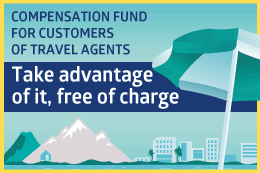Here are answers to frequently asked questions about the Compensation Fund for Customers of Travel Agents.
General information
You must have purchased services from a travel agency that holds a licence from the Office. The Fund does not protect you if you dealt directly with a service provider.
You can check whether your travel agency holds a licence using the Getting information about a merchant search tool.
No. The protection provided by the Fund can complement that provided by travel insurance. The Fund does not cover all of the situations covered by travel insurance, such as lost luggage.
Go to the Situations covered by the Fund page to find out under which circumstances the Fund could reimburse you.
Yes, but only if the purchase was made on the website of a travel agency that holds a licence from the Office de la protection du consommateur.
You can check whether the travel agency holds a licence using the Getting information about a merchant search tool. Also make sure that the notation "Fonds d'indemnisation des clients des agents de voyage" (Compensation Fund for Customers of Travel Agents) appears on your invoice before completing the transaction.
You can contact the company that should have provided the service, e.g. the air carrier or cruise line, to request a reimbursement or compensation, if applicable.
You can also check whether your insurance company can reimburse you for the services that were not provided to you. Remember to keep all your invoices and receipts to file a claim with your insurer.
If you used a credit card to pay for the services, go to the Credit card purchases page for information about your recourse options.
Lastly, please note that other laws, in addition to the one for which the Office is responsible, protect travellers. You could have recourse options, in particular as regards problems with an air carrier.
Reimbursement
The Fund does not reimburse travel services you have received but with which you are dissatisfied: e.g. a cruise that was not up to the quality you had expected.
However, if you received services that you believe did not comply with the agreement you entered into with your travel agent, you may have recourse options. Visit the Recourse Against a Travel Agent page to find out more.
No, the Fund does not provide compensation for moral damages resulting from the absence of services, such as the loss of vacation days or loss of wages caused by a flight cancellation. However, if you receive a judgment against your travel agent in which you are awarded moral damages, the Fund could pay you a maximum amount of $500.
Yes, under certain circumstances. The Fund can reimburse you if you incurred meal and accommodation expenses because you did not receive the services for which you had paid. This would be the case if, as a result of a flight cancellation, you had to find accommodations and food while waiting for another return flight. The Fund provides for a maximum reimbursement of $217 per person per day.
The Procedure to be reimbursed by the Fund page provides all the information you need in 6 easy steps.
Last update : March 22, 2024
Was the information on this page useful to you?
The information contained on this page is presented in simple terms to make it easier to understand. It does not replace the texts of the laws and regulations.









Thank you! Your comment was submitted successfully.